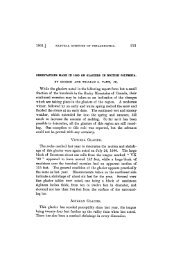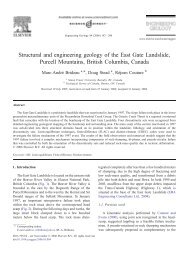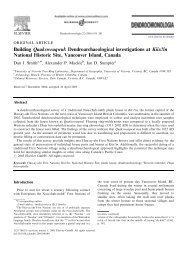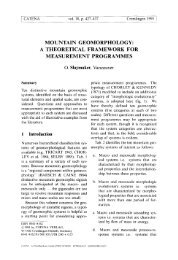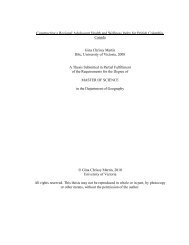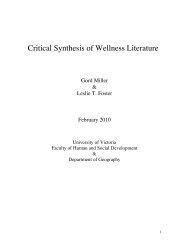Sustainable Food Production, Consumption, and the Generation of
Sustainable Food Production, Consumption, and the Generation of
Sustainable Food Production, Consumption, and the Generation of
You also want an ePaper? Increase the reach of your titles
YUMPU automatically turns print PDFs into web optimized ePapers that Google loves.
have been developed to encourage <strong>and</strong> direct sustainable urban development <strong>and</strong> many believe<br />
that sustainable food production <strong>and</strong> urban agriculture have a crucial role to play in that process<br />
(Pacione, 2001; Dernbach <strong>and</strong> Bernstein, 2003; Botelho, 1997). Although urban agriculture<br />
cannot solve Canada’s food security problems, it is recognized as an important step towards<br />
ensuring access to food (Jolly, 1997). Many initiatives <strong>and</strong> projects have proven to be effective,<br />
but <strong>the</strong>y need more policy support from municipal government. Should municipal governments<br />
begin to take a more active stance on food-security through policy <strong>and</strong> program implementation<br />
<strong>the</strong>re would be noticeable improvement in urban food systems (Pothukuchi <strong>and</strong> Kaufman, 1999;<br />
Halweil, 2004). Part <strong>of</strong> this policy must recognize a person’s right to have access to nutritional<br />
food, an essential part <strong>of</strong> food-security (Jolly, 1997; Riches, 1997). Though <strong>the</strong>re is much debate<br />
over <strong>the</strong> best implementation strategies, it is certain that <strong>the</strong>re is a need for policy at <strong>the</strong> local<br />
level to encourage sustainable agricultural practices <strong>and</strong> initiatives (Jolly, 1997; Pothukuchi <strong>and</strong><br />
Kaufman, 1999; Riches, 1997)<br />
4.2.1 <strong>Food</strong> Waste Management Policy<br />
A necessary part <strong>of</strong> any discussion <strong>of</strong> food policy <strong>and</strong> sustainable food production is an<br />
exploration <strong>of</strong> food waste management. One responsibility <strong>of</strong> sustainable agriculture is to<br />
employ more effective waste management <strong>and</strong> reduction procedures <strong>and</strong> minimize resource use,<br />
thus any policy implementation must give treatment to those issues (McRae, 1999). To meet<br />
<strong>the</strong>se goals, <strong>the</strong>re are a variety <strong>of</strong> strategies that focus on reducing packaging <strong>and</strong> waste at <strong>the</strong><br />
product source, implementing producer or consumer stewardship programs, <strong>and</strong> <strong>of</strong>fering various<br />
incentives, both social-psychological <strong>and</strong> economic, that reinforce environmentally conscientious<br />
decisions (Sinclair <strong>and</strong> Fenton, 1997; Taylor, 2000). Ano<strong>the</strong>r strategy to help enforce<br />
environmentally friendly decision making is legislation enacting bans <strong>and</strong> fines on certain<br />
activities such as private incinerators, l<strong>and</strong>fills, <strong>and</strong> littering (Taylor, 2000). These strategies<br />
depend upon legislation <strong>and</strong> policy to keep <strong>the</strong>m in place <strong>and</strong> increase <strong>the</strong>ir effectiveness. Some<br />
strategies, like bottle-return depots <strong>and</strong> o<strong>the</strong>r economic incentives have proven quite successful;<br />
<strong>the</strong> more stringent strategies depend on government or public support for <strong>the</strong>ir success. Waste<br />
management strategies have been devised that focus on division <strong>of</strong> waste in households with<br />
organized pickup schedules, incentives for industrial stewardship, reduction at source, <strong>and</strong> more.<br />
These strategies all need to be implemented at some level <strong>of</strong> government in order for citizens <strong>and</strong><br />
especially industry to expend <strong>the</strong> time <strong>and</strong> money required for success (Henningsson et al., 2004;<br />
Fehr et al., 2002; Taylor, 2000). In Canada <strong>the</strong> framework for developing such policy is hindered<br />
by <strong>the</strong> fact that <strong>the</strong> federal government cannot put through policy or legislation regarding such<br />
35




